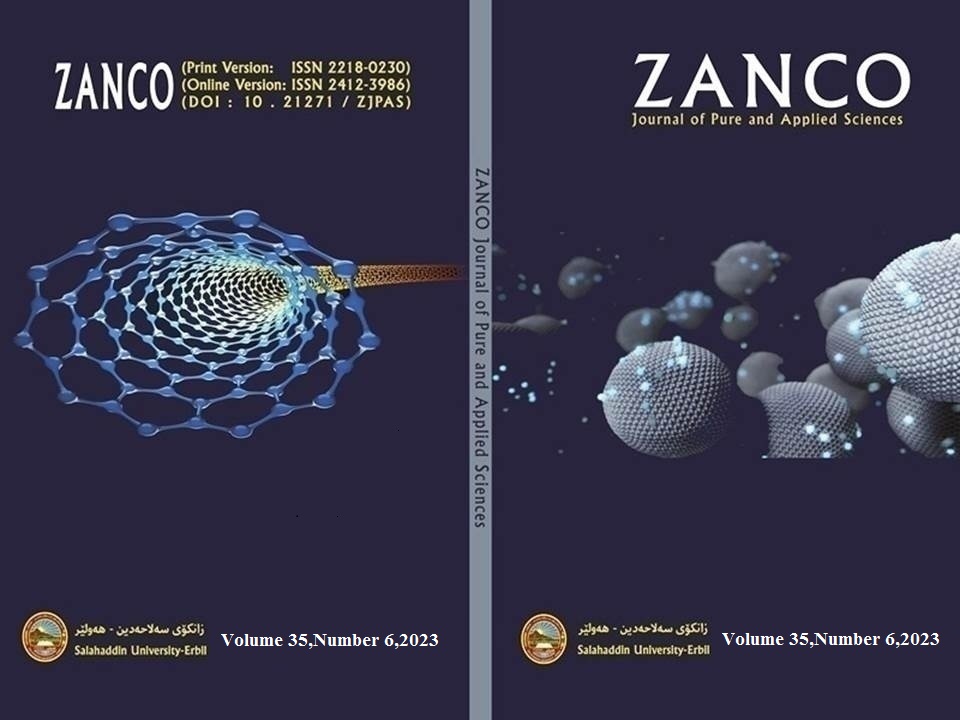DNA mismatch repair MLH1 gene polymorphism and infertility in azoospermia males in Iraqi Kurdish population
DOI:
https://doi.org/10.21271/ZJPAS.35.6.8Keywords:
MLH1 gene, Single nucleotide polymorphism, Male infertility, PCR technique, DNA sequencing, Nucleotide change.Abstract
To ensure the accuracy of DNA replication, to maintain genome stability, and to assure the preservation of a species, the DNA in the cell should be constantly repaired. The mismatch repair (MMR) process is crucial for gametogenesis, meiotic recombination, and the preservation of genomic integrity. Two MutS homologs (MSH4 and MSH5) and three MutL homologs (MLH1, MLH3, and PMS2) are members of the MMR family who actively participate in meiotic recombination and gametogenesis. About 50% of all cases of infertility are caused by male factors, and 15-20% of infertile males have genetic issues that result in azoospermia or severe oligozoospermia. This study aimed to find and discover the nucleotide changes in exons 7, and 8 of MLH1 gene in seven infertile and three normal fertile males through Polymerase Chain Reaction (PCR) and DNA sequencing. In this study pair of primers was designed according to the NCBI primer designing tool to amplify the exons 7, and 8 of MLH1 gene by PCR technique then sequencing the amplified product with Sanger sequencing. The sequence results aligned to NCBI database to find the possible nucleotide mismatch. Nine types of nucleotide variations have been detected of which seven of them are considered to be new recording nucleotide variations. These are the 37011581 A>T, 37011685 T>A, 37011767 C>A, 37011695 T> C, 37011579 A>T, 37011595 T>A and 37011717 T> C. However, the other two changes has been reported previously as defined in NCBI database which are 37011835 T> C with rs1553644000 T/C and 37012056 A>C with rs771612764 A/G. this stufy has found that, two nucleotide variants 37011595 T>A in intron 6 and 37012056 A>C rs771612764 A/G in exon 8, are exclusively detected in infertile samples and not in the normal samples. This may indicate a possible link between these variation and infertility.
References
BAARENDS, W., VAN DER LAAN, R. & GROOTEGOED, A. 2001. DNA repair mechanisms and gametogenesis. Reproduction.
BROWN, T. A. 2020. Gene cloning and DNA analysis: an introduction, John Wiley & Sons.
CHATTERJEE, N. & WALKER, G. C. 2017. Mechanisms of DNA damage, repair, and mutagenesis. Environmental and molecular mutagenesis, 58, 235-263.
HO, T. T. T., LE, M. T., TRUONG, Q. V., NGUYEN, V. Q. H. & CAO, N. T. 2020. Psychological burden in couples with infertility and its association with sexual dysfunction. Sexuality and Disability, 38, 123-133.
https://www.ncbi.nlm.nih.gov/tools/primer-blast/
https://www.ncbi.nlm.nih.gov/gene/4292
KRAUSZ, C., CHIANESE, C., GIACHINI, C., GUARDUCCI, E., LAFACE, I. & FORTI, G. 2011. The Y chromosome-linked copy number variations and male fertility. Journal of endocrinological investigation, 34, 376-382.
KRAUSZ, C. & RIERA-ESCAMILLA, A. 2018. Genetics of male infertility. Nature Reviews Urology, 15, 369-384.
LINN, E., GHANEM, L., BHAKTA, H., GREER, C. & AVELLA, M. 2021. Genes regulating spermatogenesis and sperm function associated with rare disorders. Frontiers in Cell and Developmental Biology, 9, 634536.
ORGANIZATION, W. H. 2021. WHO laboratory manual for the examination and processing of human semen, World Health Organization.
TRUNINGER, K., MENIGATTI, M., LUZ, J., RUSSELL, A., HAIDER, R., GEBBERS, J.-O., BANNWART, F., YURTSEVER, H., NEUWEILER, J. & RIEHLE, H.-M. 2005. Immunohistochemical analysis reveals high frequency of PMS2 defects in colorectal cancer. Gastroenterology, 128, 1160-1171.
World Health Organization (WHO), 2018, International Classification of Diseases, 11th Revision (ICD-11) Geneva. Avaialable at: https://www.who.int/news-room/ fact-sheets/detail/infertility
Downloads
Published
How to Cite
Issue
Section
License
Copyright (c) 2023 Muhsin Jamil Abdulwahid, Mustafa Saber Al-Attar, Samiaa J. Abdulwahid-Kurdi, Karzan Abdulmuhsin Mohammad

This work is licensed under a Creative Commons Attribution 4.0 International License.














